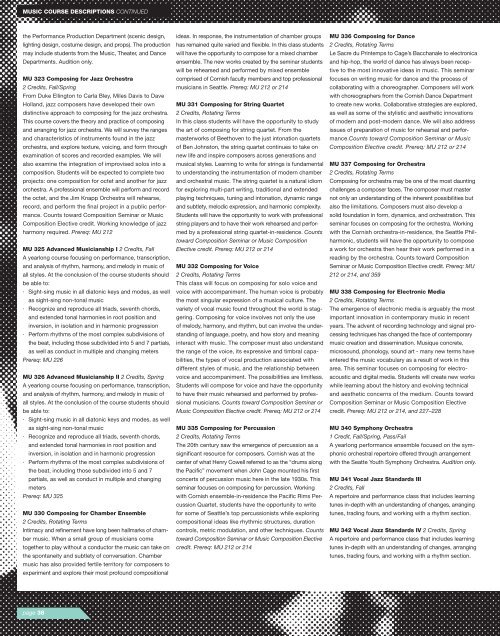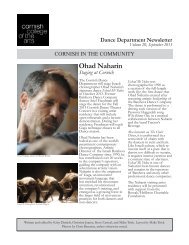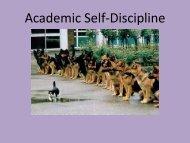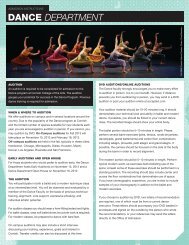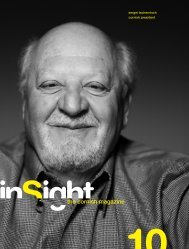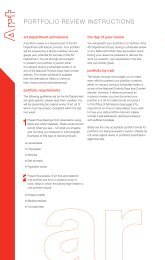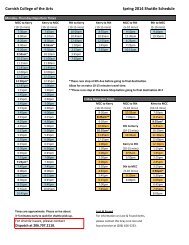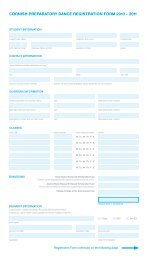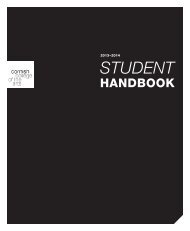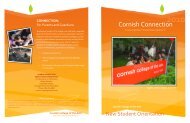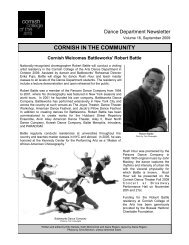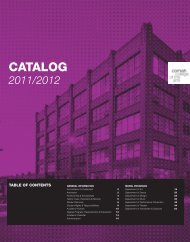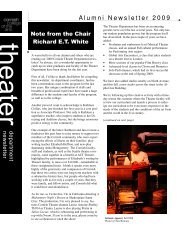current catalog - Cornish College of the Arts
current catalog - Cornish College of the Arts
current catalog - Cornish College of the Arts
You also want an ePaper? Increase the reach of your titles
YUMPU automatically turns print PDFs into web optimized ePapers that Google loves.
MUSIC COURSE DESCRIPTIONS CONTINUED<br />
<strong>the</strong> Performance Production Department (scenic design,<br />
lighting design, costume design, and props). The production<br />
may include students from <strong>the</strong> Music, Theater, and Dance<br />
Departments. Audition only.<br />
MU 323 Composing for Jazz Orchestra<br />
2 Credits, Fall/Spring<br />
From Duke Ellington to Carla Bley, Miles Davis to Dave<br />
Holland, jazz composers have developed <strong>the</strong>ir own<br />
distinctive approach to composing for <strong>the</strong> jazz orchestra.<br />
This course covers <strong>the</strong> <strong>the</strong>ory and practice <strong>of</strong> composing<br />
and arranging for jazz orchestra. We will survey <strong>the</strong> ranges<br />
and characteristics <strong>of</strong> instruments found in <strong>the</strong> jazz<br />
orchestra, and explore texture, voicing, and form through<br />
examination <strong>of</strong> scores and recorded examples. We will<br />
also examine <strong>the</strong> integration <strong>of</strong> improvised solos into a<br />
composition. Students will be expected to complete two<br />
projects: one composition for octet and ano<strong>the</strong>r for jazz<br />
orchestra. A pr<strong>of</strong>essional ensemble will perform and record<br />
<strong>the</strong> octet, and <strong>the</strong> Jim Knapp Orchestra will rehearse,<br />
record, and perform <strong>the</strong> final project in a public performance.<br />
Counts toward Composition Seminar or Music<br />
Composition Elective credit. Working knowledge <strong>of</strong> jazz<br />
harmony required. Prereq: MU 212<br />
MU 325 Advanced Musicianship I 2 Credits, Fall<br />
A yearlong course focusing on performance, transcription,<br />
and analysis <strong>of</strong> rhythm, harmony, and melody in music <strong>of</strong><br />
all styles. At <strong>the</strong> conclusion <strong>of</strong> <strong>the</strong> course students should<br />
be able to:<br />
··<br />
Sight-sing music in all diatonic keys and modes, as well<br />
as sight-sing non-tonal music<br />
··<br />
Recognize and reproduce all triads, seventh chords,<br />
and extended tonal harmonies in root position and<br />
inversion, in isolation and in harmonic progression<br />
··<br />
Perform rhythms <strong>of</strong> <strong>the</strong> most complex subdivisions <strong>of</strong><br />
<strong>the</strong> beat, including those subdivided into 5 and 7 partials,<br />
as well as conduct in multiple and changing meters<br />
Prereq: MU 226<br />
MU 326 Advanced Musicianship II 2 Credits, Spring<br />
A yearlong course focusing on performance, transcription,<br />
and analysis <strong>of</strong> rhythm, harmony, and melody in music <strong>of</strong><br />
all styles. At <strong>the</strong> conclusion <strong>of</strong> <strong>the</strong> course students should<br />
be able to:<br />
··<br />
Sight-sing music in all diatonic keys and modes, as well<br />
as sight-sing non-tonal music<br />
··<br />
Recognize and reproduce all triads, seventh chords,<br />
and extended tonal harmonies in root position and<br />
inversion, in isolation and in harmonic progression<br />
··<br />
Perform rhythms <strong>of</strong> <strong>the</strong> most complex subdivisions <strong>of</strong><br />
<strong>the</strong> beat, including those subdivided into 5 and 7<br />
partials, as well as conduct in multiple and changing<br />
meters<br />
Prereq: MU 325<br />
MU 330 Composing for Chamber Ensemble<br />
2 Credits, Rotating Terms<br />
Intimacy and refinement have long been hallmarks <strong>of</strong> chamber<br />
music. When a small group <strong>of</strong> musicians come<br />
toge<strong>the</strong>r to play without a conductor <strong>the</strong> music can take on<br />
<strong>the</strong> spontaneity and subtlety <strong>of</strong> conversation. Chamber<br />
music has also provided fertile territory for composers to<br />
experiment and explore <strong>the</strong>ir most pr<strong>of</strong>ound compositional<br />
ideas. In response, <strong>the</strong> instrumentation <strong>of</strong> chamber groups<br />
has remained quite varied and flexible. In this class students<br />
will have <strong>the</strong> opportunity to compose for a mixed chamber<br />
ensemble. The new works created by <strong>the</strong> seminar students<br />
will be rehearsed and performed by mixed ensemble<br />
comprised <strong>of</strong> <strong>Cornish</strong> faculty members and top pr<strong>of</strong>essional<br />
musicians in Seattle. Prereq: MU 212 or 214<br />
MU 331 Composing for String Quartet<br />
2 Credits, Rotating Terms<br />
In this class students will have <strong>the</strong> opportunity to study<br />
<strong>the</strong> art <strong>of</strong> composing for string quartet. From <strong>the</strong><br />
masterworks <strong>of</strong> Beethoven to <strong>the</strong> just intonation quartets<br />
<strong>of</strong> Ben Johnston, <strong>the</strong> string quartet continues to take on<br />
new life and inspire composers across generations and<br />
musical styles. Learning to write for strings is fundamental<br />
to understanding <strong>the</strong> instrumentation <strong>of</strong> modern chamber<br />
and orchestral music. The string quartet is a natural idiom<br />
for exploring multi-part writing, traditional and extended<br />
playing techniques, tuning and intonation, dynamic range<br />
and subtlety, melodic expression, and harmonic complexity.<br />
Students will have <strong>the</strong> opportunity to work with pr<strong>of</strong>essional<br />
string players and to have <strong>the</strong>ir work rehearsed and performed<br />
by a pr<strong>of</strong>essional string quartet-in-residence. Counts<br />
toward Composition Seminar or Music Composition<br />
Elective credit. Prereq: MU 212 or 214<br />
MU 332 Composing for Voice<br />
2 Credits, Rotating Terms<br />
This class will focus on composing for solo voice and<br />
voice with accompaniment. The human voice is probably<br />
<strong>the</strong> most singular expression <strong>of</strong> a musical culture. The<br />
variety <strong>of</strong> vocal music found throughout <strong>the</strong> world is staggering.<br />
Composing for voice involves not only <strong>the</strong> use<br />
<strong>of</strong> melody, harmony, and rhythm, but can involve <strong>the</strong> understanding<br />
<strong>of</strong> language, poetry, and how story and meaning<br />
interact with music. The composer must also understand<br />
<strong>the</strong> range <strong>of</strong> <strong>the</strong> voice, its expressive and timbral capabilities,<br />
<strong>the</strong> types <strong>of</strong> vocal production associated with<br />
different styles <strong>of</strong> music, and <strong>the</strong> relationship between<br />
voice and accompaniment. The possibilities are limitless.<br />
Students will compose for voice and have <strong>the</strong> opportunity<br />
to have <strong>the</strong>ir music rehearsed and performed by pr<strong>of</strong>essional<br />
musicians. Counts toward Composition Seminar or<br />
Music Composition Elective credit. Prereq: MU 212 or 214<br />
MU 335 Composing for Percussion<br />
2 Credits, Rotating Terms<br />
The 20th century saw <strong>the</strong> emergence <strong>of</strong> percussion as a<br />
significant resource for composers. <strong>Cornish</strong> was at <strong>the</strong><br />
center <strong>of</strong> what Henry Cowell referred to as <strong>the</strong> “drums along<br />
<strong>the</strong> Pacific” movement when John Cage mounted his first<br />
concerts <strong>of</strong> percussion music here in <strong>the</strong> late 1930s. This<br />
seminar focuses on composing for percussion. Working<br />
with <strong>Cornish</strong> ensemble-in-residence <strong>the</strong> Pacific Rims Percussion<br />
Quartet, students have <strong>the</strong> opportunity to write<br />
for some <strong>of</strong> Seattle’s top percussionists while exploring<br />
compositional ideas like rhythmic structures, duration<br />
controls, metric modulation, and o<strong>the</strong>r techniques. Counts<br />
toward Composition Seminar or Music Composition Elective<br />
credit. Prereq: MU 212 or 214<br />
MU 336 Composing for Dance<br />
2 Credits, Rotating Terms<br />
Le Sacre du Printemps to Cage’s Bacchanale to electronica<br />
and hip-hop, <strong>the</strong> world <strong>of</strong> dance has always been receptive<br />
to <strong>the</strong> most innovative ideas in music. This seminar<br />
focuses on writing music for dance and <strong>the</strong> process <strong>of</strong><br />
collaborating with a choreographer. Composers will work<br />
with choreographers from <strong>the</strong> <strong>Cornish</strong> Dance Department<br />
to create new works. Collaborative strategies are explored,<br />
as well as some <strong>of</strong> <strong>the</strong> stylistic and aes<strong>the</strong>tic innovations<br />
<strong>of</strong> modern and post-modern dance. We will also address<br />
issues <strong>of</strong> preparation <strong>of</strong> music for rehearsal and performance.Counts<br />
toward Composition Seminar or Music<br />
Composition Elective credit. Prereq: MU 212 or 214<br />
MU 337 Composing for Orchestra<br />
2 Credits, Rotating Terms<br />
Composing for orchestra may be one <strong>of</strong> <strong>the</strong> most daunting<br />
challenges a composer faces. The composer must master<br />
not only an understanding <strong>of</strong> <strong>the</strong> inherent possibilities but<br />
also <strong>the</strong> limitations. Composers must also develop a<br />
solid foundation in form, dynamics, and orchestration. This<br />
seminar focuses on composing for <strong>the</strong> orchestra. Working<br />
with <strong>the</strong> <strong>Cornish</strong> orchestra-in-residence, <strong>the</strong> Seattle Philharmonic,<br />
students will have <strong>the</strong> opportunity to compose<br />
a work for orchestra <strong>the</strong>n hear <strong>the</strong>ir work performed in a<br />
reading by <strong>the</strong> orchestra. Counts toward Composition<br />
Seminar or Music Composition Elective credit. Prereq: MU<br />
212 or 214, and 359<br />
MU 338 Composing for Electronic Media<br />
2 Credits, Rotating Terms<br />
The emergence <strong>of</strong> electronic media is arguably <strong>the</strong> most<br />
important innovation in contemporary music in recent<br />
years. The advent <strong>of</strong> recording technology and signal processing<br />
techniques has changed <strong>the</strong> face <strong>of</strong> contemporary<br />
music creation and dissemination. Musique concrete,<br />
microsound, phonology, sound art - many new terms have<br />
entered <strong>the</strong> music vocabulary as a result <strong>of</strong> work in this<br />
area. This seminar focuses on composing for electroacoustic<br />
and digital media. Students will create new works<br />
while learning about <strong>the</strong> history and evolving technical<br />
and aes<strong>the</strong>tic concerns <strong>of</strong> <strong>the</strong> medium. Counts toward<br />
Composition Seminar or Music Composition Elective<br />
credit. Prereq: MU 212 or 214, and 227–228<br />
MU 340 Symphony Orchestra<br />
1 Credit, Fall/Spring, Pass/Fail<br />
A yearlong performance ensemble focused on <strong>the</strong> symphonic<br />
orchestral repertoire <strong>of</strong>fered through arrangement<br />
with <strong>the</strong> Seatte Youth Symphony Orchestra. Audition only.<br />
MU 341 Vocal Jazz Standards III<br />
2 Credits, Fall<br />
A repertoire and performance class that includes learning<br />
tunes in-depth with an understanding <strong>of</strong> changes, arranging<br />
tunes, trading fours, and working with a rhythm section.<br />
MU 342 Vocal Jazz Standards IV 2 Credits, Spring<br />
A repertoire and performance class that includes learning<br />
tunes in-depth with an understanding <strong>of</strong> changes, arranging<br />
tunes, trading fours, and working with a rhythm section.<br />
page 38


